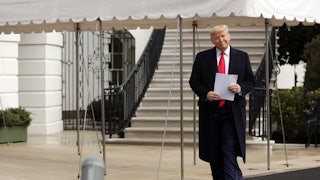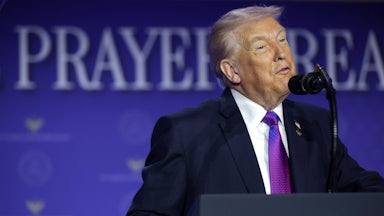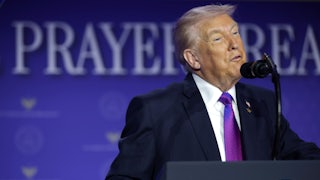Donald Trump is having a very bad week. In fact, all of winter has been a storm of legal setbacks and noteworthy news developments that make him look guilty as not yet charged. But what impact might this have on the midterms or the 2024 presidential election? The short version is, Trump is in trouble with the law, but Republicans won’t necessarily feel the heat of that at the ballot box this year. Yet the possibilities of real indictments, from Manhattan to Fulton County, Georgia, may be a factor in 2024. Republicans are already worried, and they should be.
Just this week, Trump lost a bid to shield his visitors’ logs from the January 6 committee. Why he would need to is anyone’s guess, but his effort to hide who visited him might lead to more subpoenas. Part of Trump’s winter of discontent is that the Supreme Court he shaped has not shielded his presidential records from congressional scrutiny. And a judge has reinstated the Trump Organization as a defendant in the Washington, D.C., attorney general’s civil suit against the Trump Inaugural Committee for wrongly paying nonprofit funds to the Trump Organization and family. That case is going to trial.
But the biggest hit came from Trump’s own accountants. Mazars USA dumped him like the evening trash. This has been perhaps the most consequential event so far. Why? Because Trump, through his family-owned company, is under criminal investigation by the Manhattan district attorney for bank, tax, and insurance fraud. New York Attorney General Letitia James obtained the letter from Mazars dissociating itself from the Trump Organization in her civil fraud investigation on these same grounds.
Why is this so damaging? First, let’s remember that in asking a judge to force Trump and his daughter Ivanka and son Don Jr. to sit for depositions with her office, James said the following: “We have uncovered significant evidence that suggests Donald J. Trump and the Trump Organization falsely and fraudulently valued multiple assets and misrepresented those values to financial institutions for economic benefit.” In her court filing, James laid out statements of fact to back up the serious claims.
In its letter to the Trump Organization, Mazars told the company that it now considered a decade’s worth of financial statements to be unreliable. That is serious. The Manhattan district attorney would have to prove misrepresentations of the value of Trump properties that were intentional and material, meaning they mattered to banks, insurance companies, and the New York State Department of Taxation. This statement may suggest more evidence to support indictments. The Mazars partner who represented the Trump Organization is cooperating with the district attorney’s office.
Mazars did not completely throw the Trump Organization under the bus. It also said that it did not view the discrepancies as “material,” which Trump’s lawyers can utilize as part of a defense. That will be a question for prosecutors to assess and, potentially, a jury to decide. But Trump’s younger son, Eric Trump, and his longtime chief financial officer, Allen Weisselberg, who has been indicted on allegations of tax fraud already, both sat for depositions with the attorney general’s office and asserted their Fifth Amendment rights against self-incrimination over 500 times! While our criminal system does not allow an inference of guilt from invoking the Fifth, it suggests that they are unable to answer questions in a way that absolves them of guilt or would create some doubt about whether they intended to inflate or deflate property values.
If nothing else, the negative news this generates for Trump is unhelpful, and no politician would want it. Consider that Trump has been personally linked to allegations of fraud. For example, he apparently signed the checks to pay Weisselberg’s grandchild’s school tuition, rather than pay him reportable earnings.
These very serious legal troubles, however, are unlikely to be factors in the midterm elections. For one thing, prosecutors like to win their cases, particularly high-profile cases. No one will or should go after a former president without a meticulous and careful investigation. That takes time, and often a lot of it. If indictments come, they may not come in time to influence primaries or the general election in November.
But even if they did, Trump is not on the ballot. Voters in midterm elections are rarely, if ever, voting on a former president’s reputation. At a time of rising costs, deep concerns about how children are faring in school thanks to two years of Covid-19, and anxiety over crime rates, voters will vote on their daily life concerns, not where Trump’s legal battles are playing out. For GOP candidates, there may well be a question about whether to seek Trump’s endorsement or campaigning. Remember that Virginia Governor Glenn Youngkin wisely did not appear in public with Trump.
Sadly, the GOP lies about voter fraud and the restrictive voting laws that dominate in Republican-controlled states are also factors. Whether due to voter ID requirements, shrinking numbers of polling sites, or reduced mail-in balloting, 23 million voters will find it harder to vote. Then there is the redistricting, designed to benefit incumbents or increase one party’s likely victories over another.
While Trump’s legal woes may not have an impact on the midterms, 2024 is a long way off. And while justice is blind, voters, particularly independents, may be more troubled by what they learn—and see.








